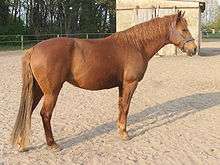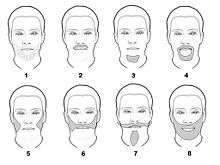Definify.com
Webster 1828 Edition
Barbe
B'ARBE.
In the military art, to fire in barbe, is to fire the cannon over the parapet, instead of firing through the embrasures.Definition 2026
Barbe
Barbe
French
Proper noun
Barbe f
- A female given name, equivalent to English Barbara as a saint's name. Usual given name form: Barbara.
barbe
barbe
French
Pronunciation
- IPA(key): /baʁb/
Etymology 1
From Middle French barbe, from Old French barbe, from Latin barba, from earlier *farba, from Proto-Italic *farβā, from Proto-Indo-European *bʰardʰeh₂ (“beard”).
Noun
barbe f (plural barbes)
- beard
- Je regardais hier le buste d'un philanthrope ; c'était une tête à moitié chauve, une barbe en pointe, et l'air d'un sous-chef à son bureau.
- (please add an English translation of this usage example)
- Je regardais hier le buste d'un philanthrope ; c'était une tête à moitié chauve, une barbe en pointe, et l'air d'un sous-chef à son bureau.
- longer hair growing on the chin or face of some animals
- La barbe d'une chèvre, d'un bouc.
- (please add an English translation of this usage example)
- La barbe d'une chèvre, d'un bouc.
- barbel, whisker-like sensory organs, located around the mouth of certain fish, including catfish, carp, goatfish, sturgeon.
- les barbes du brochet.
- (please add an English translation of this usage example)
- les barbes du brochet.
- (feather) barb
- Le duvet est constitué de petites plumes légères dont les barbes ne sont pas enchevêtrées.
- (please add an English translation of this usage example)
- Le duvet est constitué de petites plumes légères dont les barbes ne sont pas enchevêtrées.
- (botany) barb, hair or bristle.
- La besogne des bœufs terminée, vinrent des serviteurs qui, armés d'écopes de bois, élevaient le blé en l'air et le laissaient retomber pour le séparer des pailles, des barbes et des cosses.
- (please add an English translation of this usage example)
- La besogne des bœufs terminée, vinrent des serviteurs qui, armés d'écopes de bois, élevaient le blé en l'air et le laissaient retomber pour le séparer des pailles, des barbes et des cosses.
- (colloquial) a boring thing
- Quelle barbe !
Related terms
Etymology 2
Borrowing from Italian barbero, barbaro.

Adjective
barbe m, f (plural barbes)
- (horse) Barbary
- un cheval barbe.
- (please add an English translation of this usage example)
- un cheval barbe.
Noun
barbe m (plural barbes)
- Barbary horse
- Les barbes d'Abaco sont une toute petite population de chevaux barbes espagnols sauvages sur l'île d'Abaco.
- (please add an English translation of this usage example)
- Les barbes d'Abaco sont une toute petite population de chevaux barbes espagnols sauvages sur l'île d'Abaco.
Etymology 3
Verb
barbe
- first-person singular present indicative of barber
- third-person singular present indicative of barber
- first-person singular present subjunctive of barber
- third-person singular present subjunctive of barber
- second-person singular imperative of barber
References
- “barbe” in le Trésor de la langue française informatisé (The Digitized Treasury of the French Language).
Friulian
Etymology 1
From Latin barba, ultimately from Proto-Indo-European *bʰardʰeh₂.
Noun
barbe f (plural barbis)
Etymology 2
From the above term, due to the fact that a beard represents a grown or mature man. Compare Romansh, Italian, and Piedmontese barba, Dalmatian buarba.
Noun
barbe m
See also
Middle French
Etymology
From Old French barbe, from Latin barba, ultimately from Proto-Indo-European *bʰardʰeh₂.
Noun
barbe f (plural barbes)
Descendants
- French: barbe
Norman
Etymology
From Old French barbe, from Latin barba, ultimately from Proto-Indo-European *bʰardʰeh₂.
Noun
barbe f (plural barbes)
Derived terms
- barbe d'gardîngni (“thin beard”)
- barbe d'la reine (“love-in-a-mist”, literally “queen's beard”)
- barbe d'sapeur (“thick beard”)
Related terms
Old French
Etymology
From Latin barba, ultimately from Proto-Indo-European *bʰardʰeh₂.
Noun
barbe f (oblique plural barbes, nominative singular barbe, nominative plural barbes)
Descendants
Spanish
Verb
barbe
